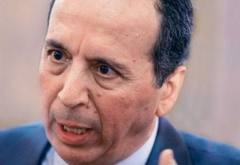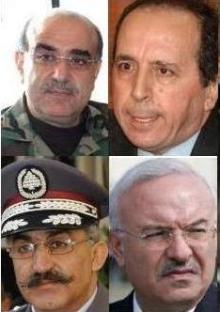 A Lebanese spy chief once jailed in connection to the assassination of Lebanese Prime Minister Rafik Hariri gave testimony Tuesday to the international tribunal tasked with trying the crime.
A Lebanese spy chief once jailed in connection to the assassination of Lebanese Prime Minister Rafik Hariri gave testimony Tuesday to the international tribunal tasked with trying the crime.
Jamil Sayyed, the former director of Lebanon’s General Security, was called to the stand in the Netherlands as a witness for Hassan Oneissi, one of the four defendants on trial. All four are at large and are being tried in absentia. The defense for Hassan Oneissi is the only defense team out of four that has elected to present a case before the tribunal.
Sayyed is one of two witnesses called by the defense, the other being Professor Siegfried Sporer, who testified last month on the general principles of eyewitness testimony and identification.

The former General Security head was one of four top security officials arrested on suspicion of involvement in the assassination of Hariri.
Sayyed, who won a seat in Parliament in Lebanon’s May 6 election, is expected to give testimony through Thursday.
He was detained months after the February 14, 2005 killing along with three other generals but released nearly four years later without charges.
The tribunal indicted five members of the militant Hezbollah group in the truck bombing that killed Hariri and 21 others. The five indicted and later put on trial in absentia included one of Hezbollah’s top military commanders, Mustafa Badreddine, who was killed in Syria in 2016.
Hezbollah denies involvement in the murder and the group’s leader, Sheik Hassan Nasrallah, has denounced the court as a conspiracy by his archenemies — the U.S. and Israel.
Hariri, who also held Saudi citizenship, was one of Lebanon’s most influential Sunni leaders, with wide connections in the Arab world and the international community.
Sayyed attacks STL
Sayyed launched a scathing attack on the U.N. body saying the investigation should have been left to the Lebanese authorities.
“Had the investigation been left in our hands I’m sure we would have reached a solution,”
Sayyed, who is currently a Hezbollah-affiliated member of Parliament asked, “The real question is why the investigation was sidetracked for four years, and in whose interest was it?”
President of the Trial Chamber Judge David Re criticized Sayyed’s treatment at the hands of the United Nations International Independent Investigation Commission at the beginning of the day’s session, saying he wished to put on the record “how badly you were treated in custody. … It is far below accepted international standards.”
According to Re, Sayyed’s detention “breaches every international human rights standard.”
Re’s fellow trial chamber judge Janet Nosworthy pressed Sayyed on certain actions taken by Lebanese authorities in the immediate aftermath of Hariri’s assassination that might be deemed suspicious, such as the quick removal of the vehicles destroyed in the bombing that killed the former prime minister. Sayyed conceded there were a lot of mistakes but maintained there had been no foul play by the Lebanese authorities.
“I don’t see that any of the institutions were intentionally trying to eradicate evidence,” he said.
Sayyed resigned from his position due to political pressure shortly after the assassination.
“The crime was bigger than all the institutions in place,” Sayyed said, claiming the crime scene investigators “didn’t have the right experience,” to which he attributed any mistakes made. Sayyed went so far as to accuse investigators from the IIIC of having demanded he fabricate evidence to make it seem as though the Syrian government had perpetrated the assassination. “I refused to be a false witness against Bashar Assad so [the commission] produced false witnesses against me,” Sayyed said.
A number of testimonies provided to the IIIC in the early days of its investigation were subsequently revealed to be false.
Sayyed said his treatment at the hands of the IIIC had changed his perceptions of international investigators. “I had the impression that the West had their own criteria, standards and ethics,” he said. “I have seen monsters. … When they act in our countries they become worse.”
He said he had told one IIIC investigator, “When I look into your glassy eyes I realize that Hitler isn’t dead, he’s still living in you.”
The MP disputed claims of a poor relationship between Hariri and Hezbollah, saying instead that “both were complementary and rendering service to the country without being in the same government. This was useful for Hariri.”
According to Sayyed, that Hezbollah entered the government following Hariri’s death was born of necessity, rather than opportunity. “Hezbollah found itself unprotected … After [Hariri’s death] Hezbollah needed to join the government for protection purposes. They couldn’t stay out of the government where hostile policies could be shaped against Hezbollah.” He claimed the group’s presence in Lebanese government is “symbolic, but strategic.”
A considerable portion of Sayyed’s testimony was dedicated to discussing the 2000 electoral law. In Lebanon, the law is known colloquially as the “Ghazi Kanaan Law,” after the Syrian head of intelligence in Lebanon who allegedly drafted it.
Sayyed, however, claimed direct responsibility for its drafting. “Neither Ghazi Kanaan, nor President Lahoud nor the Interior Minister were the architects of the law,” he said. “The president had tasked me [with it] and I formed a team.”
Rather than being designed to promote Syrian interests in Lebanon, Sayyed said the law was designed to accommodate both Christian and Muslim interests. Lebanon’s Muslim politicians, he said, wanted fewer, larger electoral districts, which would maximize the advantage of their majority, while the Christians wanted smaller districts to better safeguard the interests of minorities.
Re said that from the outside, having the director of the country’s intelligence bureau and a close confidant of the then-president draft an electoral law seems “a fairly extraordinary setup.”
“Unfortunately Lebanon is unique,” Sayyed said. “It’s different from all other countries worldwide, especially when it comes to politics.”

Leave a Reply
You must be logged in to post a comment.